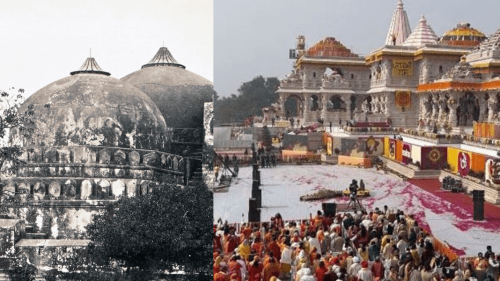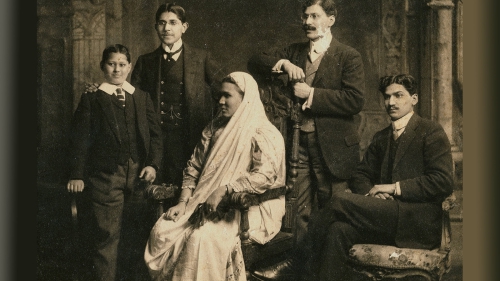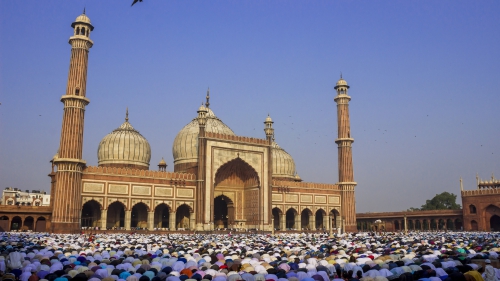ASI Reverses Decision to Charge Admission to Mosques
The Archaeological Survey of India (ASI) reversed its decision earlier this month to charge admission to Muslims who prayed in ancient mosques. The ASI, administered by the BJP-led National Democratic Alliance (NDA), oversees India's ancient monuments.
In October, the ASI began charging entry fees of between 5 Rs. - Rs. 10 per person (approx. 10 - 20 cents U.S.), depending upon the mosque. Admission was being charged at many ancient mosques, such as Qutb Minar, Humayun's Tomb, Red Fort, Purana Qila, Safdarjung Tomb, Jantar Mantar, Abdur Rahim Khan-I-Khana's Tomb, Kotla Feroze Shah, Tughluqabad Fort, Giyasuddin Tughlaq's Tomb and Sultan Garhi's Tomb. The decision led to a standoff between ASI security guards and devoted Muslims who usually came to offer prayers at the 746-year old mosque built by Muslim king Feroze Shah Tughlaq.
Muslims began to gather outside the gate of the mosque around noon that day and their number, which included women, swelled to more than 1000. The crowd entered the gate, shouting slogans of Allahu Akbar (Allah is Great), BJP Murdabad (Death be to BJP), BJP Hai Hai (Shame on the BJP), La Ilaha Illallhu Muhammadur Rasulallahu (There is no God but Allah, Muhammad is Allah's Prophet). The ASI authorities and security guards remained silent during the protest. In the un-roofed mosque, which can hold up to more than 5,000 worshippers, Muslims gathered under the burning sun. There Shoaib Iqbal, leader of the Janata Dal Legislative Party in the Delhi Assembly and Syed Yahya Bukhari, son of Maulana Syed Ahmed Bukhari, Shahi Imam of the Delhi Jama Masjid, addressed the gathering. The Shahi Imam was absent due to his illness. In his address, Mr. Shoaib Iqbal, who was in the forefront in protest against the ASI decision, drew attention to the demolition of the Babri Masjid in Ayodhya.
"They have targeted our mosques and ASI is functioning in accordance with ISI, Pakistan's intelligence agency. There is no difference between ASI and ISI," he said to the angry crowd. "The ASI is charging Rs. 5 for every entry. This shows that a Muslim will have to pay Rs. 25 a day in order to offer the five-time prayers in this mosque. The poor Muslim community cannot afford this."
He also said that the superintending archaeologist at ASI had acquiesced in withdrawing the decision for the Friday Prayers.
"He has verbally assured me that no charge will be asked for other prayers. We want his assurance in black and white," said Iqbal. "We want all to be allowed to enjoy religious freedom in full."
Similar demonstrations were held at the mosque adjacent to the Taj Mahal, where ASI employees were charging as much as $10.00 U.S. from foreign tourists.
Crowds of Muslims gathered in large numbers and forcibly entered the premises and closed the ticket windows. As soon as the booking window opened, they shouted slogans, causing work to come to a halt. Protestors also organized demonstrations at the Red Fort and prevented workers there from selling tickets.
In order to avoid further confrontation with the Muslim community, the ASI, which is under the Ministry of Human Resources Development, decided to roll back its two-week-old decision on November 3 and allowed Muslims to offer the Juma Prayers in the mosque free of charge. There are also widespread complaints from Muslims that the ASI has neglected the upkeep of most of these ancient mosques. There are usually no arrangements for cleaning and maintaining the facilities. Some even lack electricity.
In an interview with iviews.com, the Imam of the mosque adjacent to the Outb Minar said that his mosque lacks electricity and toilets are never cleaned. He also maintained that leaves, bird droppings and dirt are scattered all over the mosque.
The ASI authorities have apparently only maintained places that are considered to be sources of income for the agency. But critics say mosques are not meant for earning revenues or sightseeing, but rather as places of worship. Some also say that the Indian government is too preoccupied with such trivial matters when it should be focused on bigger problems, such as illiteracy, unemployment, poverty, corruption, and health care. A few have even criticized the government for targeting Muslims.
_________________________________________
Muhammad Faheem is a freelance journalist in New Delhi, India.

















